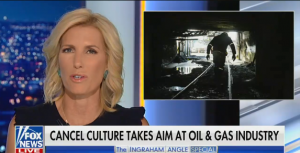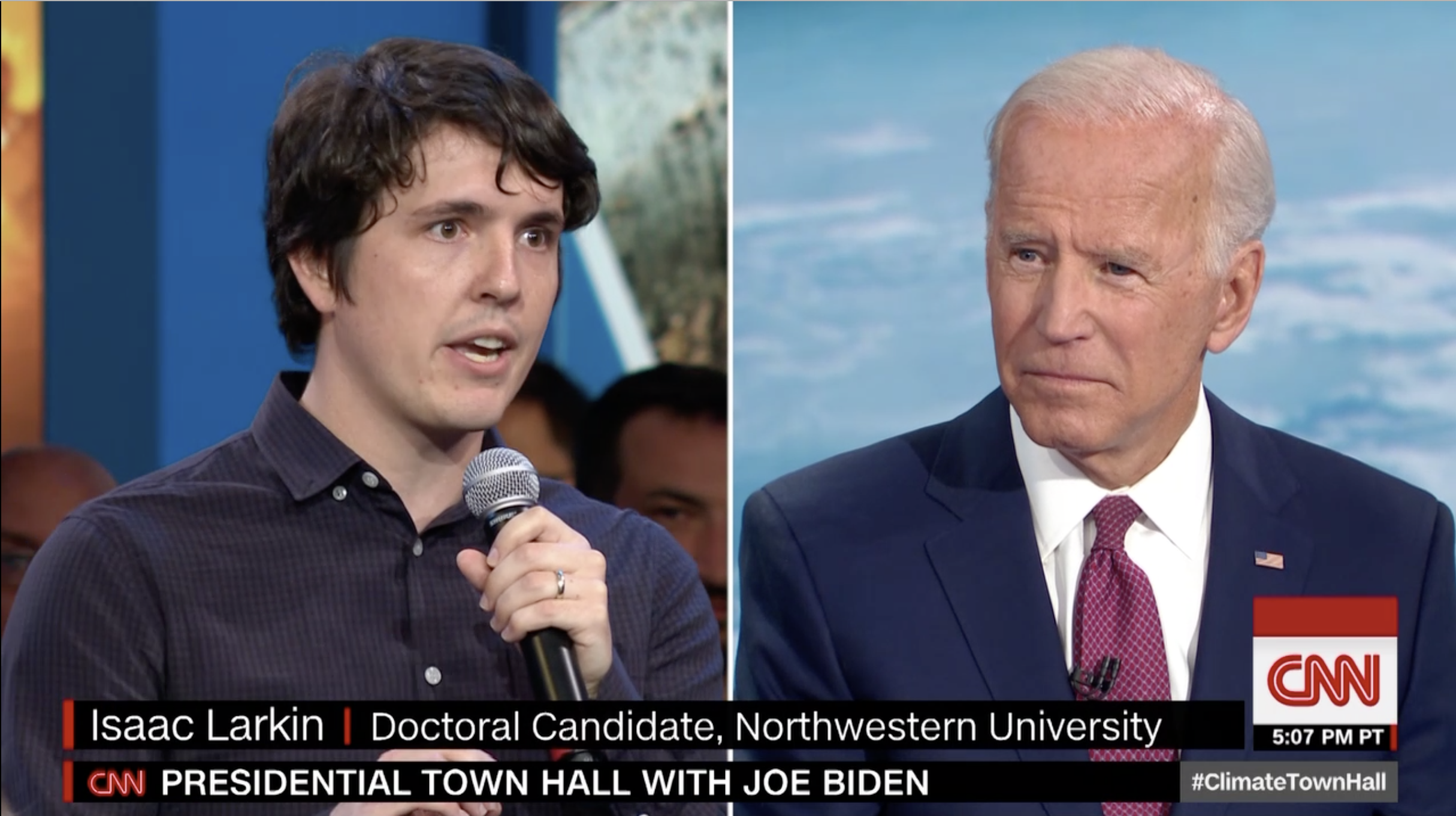It’s been a few days since the CNN Climate Town Hall marathon of climate discussion wrapped up, and we’ve had a moment to catch our collective breath, read the hot-takes, and think about what it was that we spent seven hours of our life watching. Here are a few takeaways we here at Oil Change think are worth highlighting…
It was basically good!
The Climate Town Hall was, by and large, better than expected. We had been worried about potentially awful questions, boring or weak responses from candidates, and little or no drama or interesting moments. And for the most part we got the opposite. The questions — particularly from audience members — were generally thoughtful, save for a few questions about hamburgers, straws, or light bulbs that we would do without. Likewise, the responses from candidates were mostly passionate and engaging, and there were several 2020 contenders seemingly competing to give the most ambitious answers. And finally, we saw some drama, which we’ll get to below.
My colleague Collin summed up the sentiments of many about how far the discussion has come:
Incredible to see @CNN asking nearly all candidates about banning #fracking & fossil fuel exports.
10, 5, even 2 years ago – these were fringe ideas for mainstream Dems.
This is what shifting the Overton window looks like. So much love for the movement tonight. #ClimateTownHall
— Collin Rees (@collinrees) September 5, 2019
“Cancel culture takes aim at oil and gas industry.”

Some of the best questions from audience members and CNN hosts were about policies and plans to ramp down fossil fuel production in the United States. Oil Change International analysis has shown two important things: First, existing fossil fuel projects around the globe have more oil, gas, and coal beneath them than we can afford to burn if we want to meet our climate goals; second, the oil and gas industry is eyeing a massive expansion of production in the United States over the coming decades. Something has to give, and our next president needs to stand up for communities and the climate by implementing a just and managed phase-out of fossil fuel production. Two critical questions during the CNN Climate Town Hall helped to draw this out:
-
- Near unanimous support from candidates for ending new fossil fuel leasing on public lands and offshore waters. This is a major win for local communities and a climate movement that has been fighting for this federal action since the Obama years and before. Fossil fuels from public lands account for nearly a quarter of U.S. emissions, so this is an important step toward a full phase-out of fossil fuel extraction.
- Majority support for a ban on fracking. While Senator Klobuchar went so far as to parrot the fossil fuel industry talking point of gas as a bridge fuel, most other candidates who were asked if they supported a fracking ban expressed support for banning this dangerous extraction process that is driving an out-of-control expansion of oil and gas production in the U.S.
In general, we saw a new and appropriately combative posture towards the fossil fuel industry from many candidates throughout the night. As Vox put it, the oil and gas industry (and I would add coal) was a “loser” in the Climate Town Hall. This is a very good thing. We know that we already have more fossil fuels under active production than our climate can afford, and there is no room for negotiation with an industry that has been blocking progress, buying off politicians, and obscuring science to protect their profits for decades.
In the past we’ve seen candidates at all levels suggesting a softer approach towards this industry or even putting forth industry-endorsed plans, but this time there were multiple candidates talking about holding this rogue industry to account, through lawsuits for lying to shareholders and the public, ending fossil fuel subsidies, charging them for their pollution, and more.
Journalist Antonia Juhasz summed it up well:
So, it's sounds like an emerging consensus is forming for the policy of "managed decline in fossil fuel production" from Dem candidates at #ClimateTownHall and in the Climate Action plans. The agreed starting point: U.S. public lands and offshore waters, and disuse of #fracking.
— Antonia Juhasz (@AntoniaJuhasz) September 4, 2019
And, as Dave Weigel of the Washington Post put it, “Democrats are done with ‘all of the above’ energy.” Good riddance.
The No Fossil Fuel Money pledge has a (viral) moment.
As alluded to above, there was also some drama amidst the climate plan specifics and bold, anti-industry positions. During former Vice President Joe Biden’s segment, Isaac Larkin, a young activist affiliated with the Sunrise Movement, was given the mic to ask a question about Biden’s ties to the fossil fuel industry. Isaac challenged Biden on the fact that, despite having taken the No Fossil Fuel Money pledge, Biden was set to attend a fundraiser hosted by a fossil fuel company founder the very next day (as revealed by CNBC earlier in the day).
Biden was simultaneously rattled by the question and armed with a talking point using a technicality in the pledge’s rules to maintain he was not breaking his pledge. The question and answer is worth a complete viewing, found here:
Joe Biden says he might reconsider a fundraiser scheduled for Thursday after being confronted and told about its host’s connections to the energy industry #ClimateTownHall https://t.co/VDehXzZTW9 pic.twitter.com/6DhMi8wwed
— CNN Politics (@CNNPolitics) September 5, 2019
I posted a thread of tweets responding to this exchange, clarifying that while it may technically be the case that the fundraiser didn’t break the letter of the rules spelled out in the No Fossil Fuel Money pledge, it clearly goes against the pledge’s spirit (click the tweet for the full thread):
At #ClimateTownHall @JoeBiden just talked about looking at the SEC filings of Western LNG to provide him cover on the #NoFossilFuelMoney pledge for a controversial fundraiser tomorrow. Let's break down what he's talking about… https://t.co/mOQFrICgYm
— David Turnbull (@david_turnbull) September 5, 2019
This exchange quickly became the most talked-about moment of the entire seven hours. The issue was covered by the New York Times, the Washington Post, CNN, Politico, CNBC, Vox, Huffington Post, the Associated Press, Reuters, Bloomberg, and many more. In essentially every outlet, the conclusions were the same: If a candidate intends to stand up to the fossil fuel industry, it’s probably not a good look to have a fossil fuel company founder, host a high-dollar fundraiser to benefit your campaign (even if they may not technically be an executive at the company).
More broadly, the No Fossil Fuel Money pledge has clearly become a minimum standard for being considered a leading candidate for the Democratic party nomination. Every single one of the participants in the CNN Climate Town Hall had taken the No Fossil Fuel Money pledge, and several spoke about standing up to the fossil fuel industry and breaking its grip on Washington. And it’s no surprise — voters are sick and tired of the way the fossil fuel industry is delaying progress on our climate crisis, and they are demanding that their elected officials stand up to this out-of-control industry in defense of our communities and our climate.
One final lesson we can draw from the CNN Climate Town Hall is that seven hours of discussion only scratched the surface. Our climate crisis touches every aspect of society and politics, and thanks to solid questions and mostly-prepared candidates, we saw that a robust conversation of the climate crisis is both possible and essential.
With the CNN Climate Town Hall success, #ClimateStrikes coming up in under two weeks, another climate forum hosted by MSNBC, and climate plans being dropped on a near day-to-day basis, the climate crisis has finally landed in the very center of the political discourse. It’s about time.

